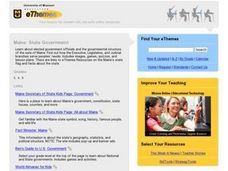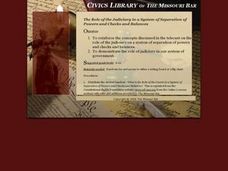Curated OER
The Missouri Compromise of 1820
Students use a map of the Missouri Compromise to explain the geographical changes it brought to the U.S. and why the changes provoked a debate over the expansion of slavery in the U.S.
Curated OER
The Powers of National and State Government
Students define term federalism, identify the powers granted to state and national government, and identify powers shared by the state and national governments.
Curated OER
An Early Threat of Secession: The Missouri Compromise of 1820 and the Nullification Crisis
High schoolers examine the controversies over slavery's expansion and how the federal tariffs further entrenched the dividing line between northern and southern interests.
Curated OER
Is Government Necessary?
Learners investigate the purpose of Congress and determine how it affects them. They explain what life would be like without government.
Curated OER
Express Your Opinion
Students explore local, state, and national levels of government and discuss which level of government they should contact to get information, express their opinions, or get help on specific issues.
Curated OER
An Early Threat of Secession: The Missouri Compromise of 1820 and the Nullification Crisis
Students analyze an interactive map of the Missouri Compromise to identify the regions and their relation to slavery. In this pre-civil war era lesson, students read primary source documents and research online to answer questions...
Curated OER
The Role of Government and Citizens
Students define term representative democracy, explain how the government responds to the needs of its citizens, describe the role of citizens in a representative democracy, and explain how citizens can influence public policy.
Curated OER
Maine: State Government
Young scholars participate in interactive lessons to study the history and government of Maine. They observe the studenT Cabinet of Maine and assess its goals and work.
Curated OER
The Role of the Judiciary in a System of Separation of Powers and Checks and Balances
High schoolers determine the role of each branch of government in a system of checks and balances. They demonstrate the role of the judiciary in American government
Judicial Learning Center
Your 4th Amendment Rights
Americans love to learn about their rights, especially those that protect them from the government's power to invade their privacy. Young people are especially engaged by this topic. An informative lesson explores four Supreme Court...
Curated OER
The Kansas-Nebraska Act of 1854: Popular Sovereignty and the Political Polarization over Slavery
Why did Stephen Douglas support the Kansas-Nebraska Act of 1854? Why did Abraham Lincoln oppose it? Young historians examine how the Kansas-Nebraska Act of 1854 affected the political balance between free and slave states and explore how...
Curated OER
Missouri's Early Slave Laws: Missouri's Early Slave Laws:
Students analyze and discuss various documents relating to slavery in Missouri in the 1830's and 1840's. They learn why some records are deemed to be of permanent, historical value to the state.
Curated OER
Members of Congress Who Have Made a Significant Contribution
Students examine laws that have benefited the nation in a variety of ways. The congressperson in the legislative branch of the government primarily responsible for the passage of the law and the current representatives are sought in this...
Curated OER
How Ordinary People Can Have an Impact
Students identify three or more ways the Federal Government impacts their daily lives and then explore ways in which citizens can influence political leaders.
Curated OER
Maine: State Flag
Students explore the meaning of the symbols and colors on the Maine state flag. They investigate the history of its design. They print out copies of the flag and color them.
Curated OER
Sectionalism
Students examine sectionalism. In this sectionalism activity, students explore reasons sectionalism developed. Students realize the conflicts that led to the Civil War and how sectionalism affected citizens on the border of Kansas and...
Curated OER
Government: Missouri Bar Civics Library
Students visit the Missouri bar Website to examine information about the U.S. Constitution and its Amendments. They complete a variety of activities from the provided lessons including the judiciary, Fourth Amendment issues, civil law,...
Curated OER
Maine: State Facts
Students participate in various activities focusing on facts about Maine. They participate in interactive lessons with trivia facts, symbols, and statistics. They research the meaning of the state flag.
Curated OER
The Role of the Judiciary in a System of Separation of Powers and Checks and Balances
Students determine the difference between the different branches of government and assess the role of each within the American governmental system.
Curated OER
Cartoons for the Classroom: Oil Spill Perspectives
With the BP oil spill still fresh on your scholars' minds, take the opportunity to analyze various perspectives on it through political cartoons. This critical-analysis handout features 2 cartoons on the incident. Background information...
Curated OER
A House Dividing: The Growing Crisis of Sectionalism in Antebellum America
Students explore the debates over American slavery and the power of the American federal government for the first half of the 19th century and how the regional economies and political events produced a widening split between the states.
Federal Reserve Bank
Piggy Bank Primer: 25 Cents Worth of History
It's all about money. Here's a resource that introduces kids to the Federal Reserve System, different coins produced by the mints, and fun facts about state coins.
Curated OER
The Role of the Media
Students participate in class discussion to investigate how media affects the ideas of Americans (specifically in politics) and then research events in political history to analyze how the media may have influenced the government's...
Curated OER
Participating in the Political Process
Students explain why it is important to participate in government, and name at least three ways citizens can participate.

























